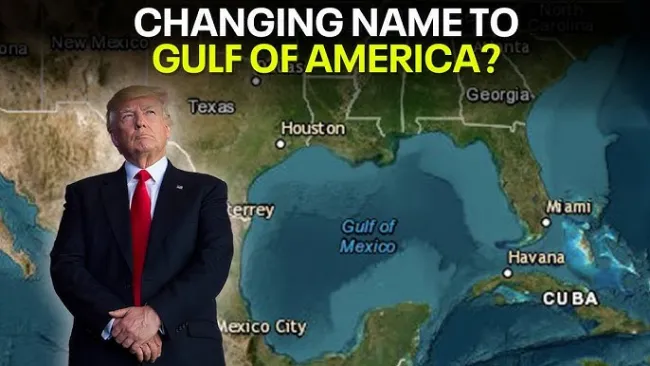Trump’s Bold Power Play: Renaming the Gulf of Mexico to the ‘Gulf of America’ Sparks Global Outcry and Debate Over U.S. Expansionism
In a bold and contentious move, President-elect Donald Trump has proposed renaming the Gulf of Mexico to the "Gulf of America," a symbolic gesture tied to his "America First" agenda. Announced during a press conference at Mar-a-Lago on January 7, 2025, the proposal has sparked widespread debate over its implications for U.S. foreign policy, regional geopolitics, and international relations. This article examines the motivations behind Trump's plan, its potential consequences, and the broader context of his expansionist policies.
The Proposal to Rename the Gulf of Mexico
Trump's plan to rebrand the Gulf of Mexico as the "Gulf of America" stems from his focus on asserting U.S. dominance in North America. He described the new name as having a "beautiful ring" and justified it by emphasizing the U.S.'s significant economic and strategic interests in the region. The Gulf of Mexico is a critical hub for U.S. energy production, accounting for half of the nation's petroleum refining capacity and 40% of its seafood supply.
This proposal is not merely symbolic; it aligns with Trump's broader immigration and trade policies. He has frequently criticized Mexico for its handling of illegal immigration and drug trafficking, threatening tariffs and other economic measures to pressure the country. By renaming the Gulf, Trump aims to reinforce U.S. control over the region and send a strong message to Mexico and other neighboring nations.
Geopolitical and Economic Implications
The Gulf of Mexico is a key geopolitical area, connecting the U.S., Mexico, and Cuba. Trump's proposal to rename it reflects his desire to assert greater economic and political influence in the region. However, this move risks straining relations with Mexico, the U.S.'s largest trading partner, with bilateral trade exceeding $800 billion annually.
Experts suggest that the name change is unlikely to have a practical impact on U.S. interests but could harm diplomatic ties. Mexican officials have already rejected Trump's rhetoric, reaffirming their commitment to addressing drug trafficking and illegal immigration. The proposal also raises concerns about the U.S.'s respect for international law and the sovereignty of neighboring countries.
Broader Expansionist Policies
The "Gulf of America" proposal is part of Trump's wider expansionist agenda. During the same press conference, he refused to rule out using military force to regain control of the Panama Canal or acquire Greenland, citing national security concerns. These statements reflect his belief in the U.S.'s right to dominate its sphere of influence, echoing a modern interpretation of the Monroe Doctrine.
Critics argue that Trump's approach could weaken long-standing alliances and alienate key partners. For example, his threats to impose tariffs on Denmark over Greenland have been met with resistance, with Danish Prime Minister Mette Frederiksen stating that "Greenland belongs to the Greenlanders." Similarly, Canadian Prime Minister Justin Trudeau dismissed Trump's suggestion of annexing Canada as the "51st state," calling it unrealistic.
Domestic and International Reactions
The proposal to rename the Gulf of Mexico has drawn mixed reactions. Supporters, such as Representative Marjorie Taylor Greene, have applauded Trump's initiative, with Greene announcing plans to introduce legislation to formalize the name change. Critics, however, have labeled the move as performative imperialism, arguing that it distracts from pressing issues like climate change and economic inequality.
Internationally, the proposal has been met with skepticism and concern. Analysts warn that Trump's aggressive rhetoric could encourage nationalist leaders in other countries, leading to a more fragmented and confrontational global order.
Conclusion
Trump's proposal to rename the Gulf of Mexico to the "Gulf of America" is a symbolic yet significant step that reflects his broader vision of U.S. dominance in the Western Hemisphere. While it underscores his commitment to the "America First" agenda, it also raises important questions about the future of U.S. foreign policy and its impact on international relations. As Trump prepares to take office, the world will be watching closely to see whether his symbolic gestures translate into concrete actions—and what the consequences will be for the Gulf of America and beyond.
